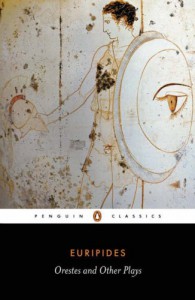Athens and the Children of Heracles

The only reason I got this volume was because it contained the one Euripidean play that I did not have: the Heraklidae (or, the Children of Heracles). Herakles, otherwise known in Latin as Hercules (which is the term we generally use) was an ancient Greek hero and demigod. He is most famous for the twelve labours, but he appears elsewhere, notably as one of the Argonauts who sailed with Jason to search for the golden fleece (though he is left behind halfway there and goes his own way). Heracles is also well known for his strength, and in Greek Mythology he does seem to come out as a 'strong man' in the same sense that Samson of the Bible does. To me he is simply a hero in the same sense as Achilles.
Heracles is also known for having over 700 children, and as such creating a race who eventually invaded and conquered the Peloponesian peninsula. The play is set before their rise to power (though it needs be remembered that there was an awful lot of them). Heracles' offspring come to blows with the King of Mycenae and flee to Athens for protection. While there the king raises an army, but the Athenians warn him that the Heraclidae are under his protection. However an oracle says that unless a woman is sacrificed then they will lose the war. One Athenian (no doubt in love with one of the Heraclidae) offers herself up, and thus they go to war and win, and capture the King of Mycenae alive. They are reluctant to execute him, but he prophesies that if they kill him then his spirit will become a defender of Athens.
Euripides wrote this play during the Peloponesian war, and while we have a lot of his plays, he was always second best to his contemporary Sophocles. Initially only seven of his plays were to survive (in the same sense that we have seven each of the other two great tragedians), however an entire volume of plays also managed to survive and as such he have a much larger collection than normal. The Heraclidae would be one of those plays.
This play, obviously written during the war, is designed as a patriotic piece to inspire the Athenians during a dark period of their history. As mentioned, the Heraclidae became the Peloponesians, of which Sparta is one of the many cities. Thus the audience is reminded of a time when they were the protectors of those who are now enemies, and is a way to justify their current actions. Further, the sacrifice of the former enemy of the Heraclidae is a reminder of a promise that Athens will be protected.
Greek myth is very fluid and tends to change depending on the location and the events. Perseus is considered to be the father of the Persians and Media is the mother of the Medes. Both characters where betrayed by Greek kings, which is why their respective countries became enemies. Of course it is highly unlikely that either of these characters were to ancestors of these races, but in a Greco-centric world, one does not accept that there is any explanation beyond your own borders (which is very true of what is happening today).
 5
5


